
We ARE amused(ish): What the Royal family finds funny
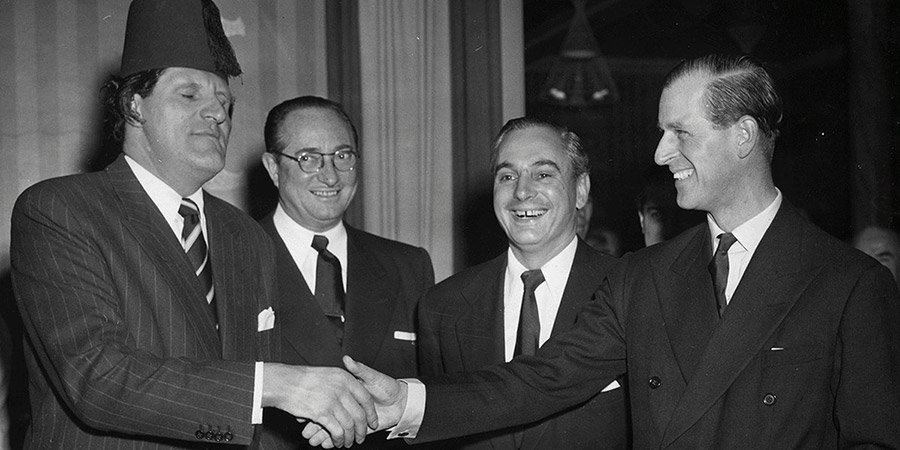
The imminence of the annual Royal Variety Performance (Sunday 19th December, 7:20pm, ITV) - an event that always features a fair number of British comedy figures - is a good enough excuse to ponder one particular question: namely, which comedians have ever really struck the Royal family as funny?
The failure rate, over the years, has surely been great. Certainly, in the particular case of the Royal Variety Performance, the number of comics who have struggled to elicit so much as a stray titter from out of the shadowy maw that is the royal box has been dispiritingly high; indeed, one rumoured reason why the name of the event was changed from 'Royal Command Performance' to 'Royal Variety Performance' was that none of the royals attending (although they were happy enough to go on supporting the event's admirable charitable cause) wanted to be thought to have 'commanded' the presence of so many performers they personally detested.
This fear of comedians claiming royal patronage is probably one reason why members of the Royal family seem to try so hard to maintain a stiff-lipped sang-froid in the face of funny, or would-be funny, people. There is, to be fair, a basis in history for such wariness - and its name is Beryl Formby.
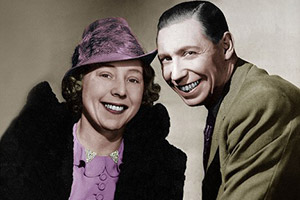
Beryl Formby was the formidable wife and manager of the Wigan-born singer and comedian George Formby. The Royal family genuinely liked George Formby throughout his heyday during the 1930s, 40s and 50s - indeed, to this day, it is said (originally via an insider source tapped by Gyles Brandreth) that The Queen herself knows the lyrics off by heart to most of George's songs, including many of his more risqué ones - and he was a welcome guest at several royal events.
The problem was that Beryl Formby (who was a quite fantastic snob, even though she dropped and added her own aitches in all the wrong places) convinced herself that her presence at the Palace was not merely as a 'plus one' but rather as a much-admired star in her own right. A prize-winning clog dancer in her youth, Beryl had long since moved from performing to managing, but, so strictly did she control her husband's life and career, she regarded any plaudits that came his way as hers as much as - if not more than - his (hence all of their cabin cruisers had to be named 'Lady Beryl', and no fewer than five of their homes in succession had to be named 'Beryldene'). Whenever, therefore, she had accompanied George to any royal residence, she would not only never stop talking about it afterwards but would also embellish every detail to an increasingly ridiculous extent.
Her most egregious instance of exaggeration (confirmed on many occasions by her long-suffering home help, who was - full disclosure - my paternal grandmother) was always triggered by her overhearing someone else, just as fanciful, recalling their own recent brush with royalty. After putting up with this pretentious patter for as long as she could stand to - which was usually no more than about half a minute - Beryl would suddenly snap, stick her nose up in the air and announce loudly: 'Oh, that's nothing! That's really, really nothing at all, dear! George and I have been to Windsor Castle that many times that, the last time we were there, just as we were leaving, the King rushed over to us and said: "Well, now you know where we live - don't be strangers!"'
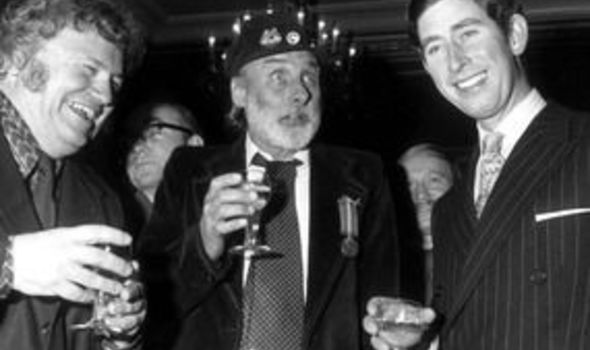
A rather different kind of danger of regal abuse became evident even when there was a real and direct connection between comedian and Crown. Prince Charles's longstanding affection for Spike Milligan, for example, was always destined to end in tears, and it did so in 1994 at the British Comedy Awards, when the Prince of Wales had a letter read out, on air, congratulating Milligan on winning a lifetime achievement award. Milligan listened attentively, and then muttered: 'Grovelling little bastard'.
It prompted huge publicity and a fair amount of embarrassment on both sides. Milligan later apologised to the Prince, sending him a fax that said: 'I suppose a knighthood is out of the question?' Charles, to his credit, replied in similarly jocular fashion, saying privately: 'I'm sorry, all the New Year's knighthoods are full up, but try a little light grovelling and one might come your way'.
In truth, however, there had been a shot across the bows, and the royals on board had not liked it one little bit. Consorting with comedians, as a consequence, was deemed quite pointlessly dangerous.
From the royal point of view, this is quite right. The great Victorian political analyst Walter Bagehot famously warned the Royal family to guard the charmed spectacle jealously: 'Above all things our royalty is to be reverenced, and if you begin to poke about it you cannot reverence it. When there is a select committee on The Queen, the charm of royalty will be gone. Its mystery is its life. We must not let in daylight upon magic.'
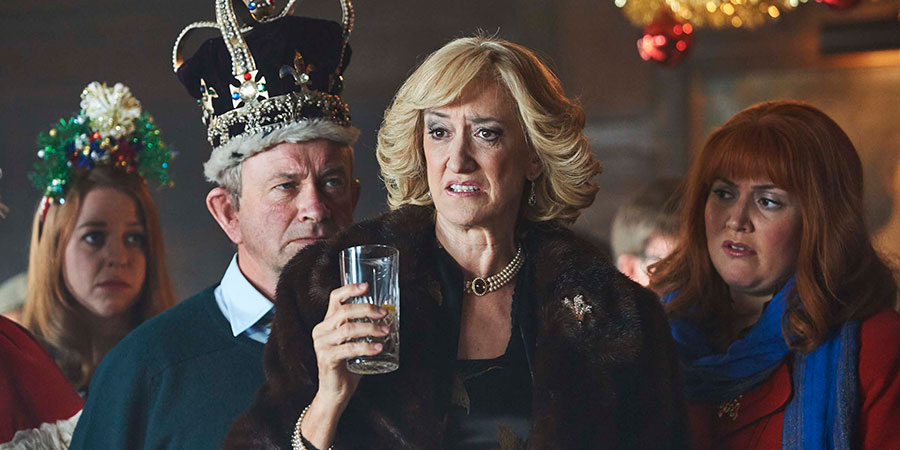
Comedians, in this sense, are close to being at the top of the list of potential royal 'poke abouters'. They are, by nature, name-callers and finger-pointers, the first to announce it when the emperor has no clothes, or when only one of the three elements of state is actually democratically elected and formally accountable. If anyone, therefore, is going to let in daylight upon magic, it is a comedian. So it is perfectly logical for royals to regard comics with extreme caution.
Taming one has never been a satisfactory solution. A court jester is a caught jester, a wing-clipped wag. There is no point in the royals getting their own 'grovelling little bastard' because there are no laughs to be had, for them or for us, from mere lickspittles.
They are stuck, as a consequence, with the wild ones, and the wild ones, running free, can always be a problem. It is the odd contretemps with the likes of a Spike Milligan, therefore, combined with the Beryl Formby style of taking the imperial names in vain, that have helped make the royals more determined than ever to seem quite inscrutable when exposed to something as rudely unruly as humour.
If a smile is going to be taken as a seal of approval, then they are going to stifle it if at all possible.
With some performers, it has to be said, they have required no real effort at all to maintain a suitably solemn face. The Queen, who according to some accounts is no slouch when it comes to issuing swingeing cultural critiques (after enduring a rendition of Cathy's Clown by the Everly Brothers, she is said to have muttered to a lady-in-waiting, 'They sound like two cats being strangled'), has, for the past seven decades, sat frowning through a seemingly endless succession of big bow-tied stand-ups, and then exacted her revenge at the post-performance line-up via such tried and tested routines as affecting to forget what act they had only just done, or making a deceptively bland observation ('You seemed to be enjoying yourself,' she remarked tartly one year to Des O'Connor), or, in the case of Miranda Hart after the Jubilee Concert of 2012, simply standing and yawning at her.
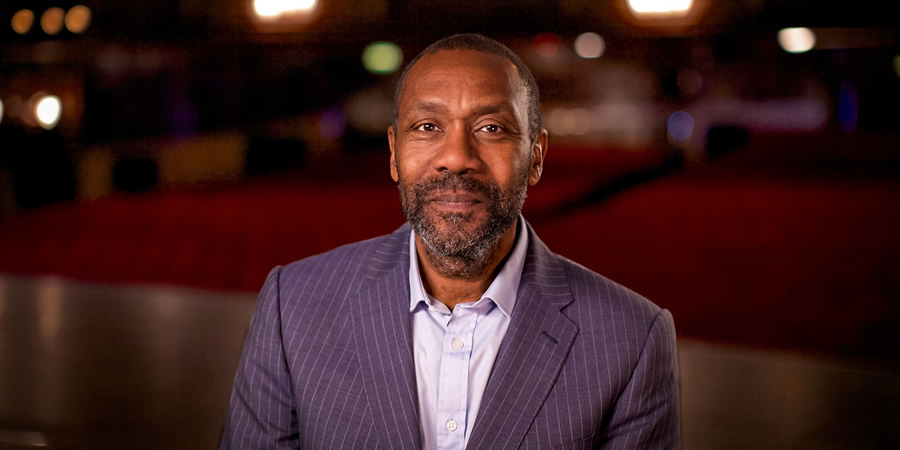
Prince Philip, predictably, was often considerably more direct when conveying his displeasure at such events - 'What do you gargle with - pebbles?' he once asked Tom Jones, very loudly, after one Variety Show - although he was arguably even more dangerous when trying to copy The Queen by avoiding a straightforward critique - 'You could smuggle a bottle of gin out of the country in that artificial foot,' he once told the Australian comic Adam Hills by way of an upbeat distraction, while on another occasion he announced abruptly to Lenny Henry, 'You're not even on television anymore, apart from those Premier Inn adverts!'
The attitude of Princess Margaret was always rather more complicated. If the recent recollections by Sherrie Hewson are anything to go by, The Queen's younger sister got through Royal Variety shows by drinking steadily until practically everything struck her as funny. In other contexts, however, her sense of humour (in spite of her friendship with Peter Sellers) appears to have been somewhat delicate, and operated strictly on her own terms (one dinner guest at Kensington Palace - the biographer Michael Holroyd - who mistook her own speaking voice for one of the 'hilarious' impressions he had been told that she liked to perform, found his over-enthusiastic table-banging reaction - 'Oh, Ma'am, that's priceless!' - greeted by the iciest of regal stares).
It is not that the Royal family dislikes all comedians - far from it. While The Queen herself appears unusually discriminating in her comic tastes, the Queen Mother practically had her own salon devoted to humourists (and was an avid fan of everything comical on TV from Dad's Army to Ali G). On one memorable occasion, a Church of England bishop, preparing for prayers at Windsor Castle, was surprised to be interrupted by The Queen knocking on his door, enquiring: 'Would you mind awfully putting back the time of the evening service as Mummy really wants to watch Hi-De-Hi!?'
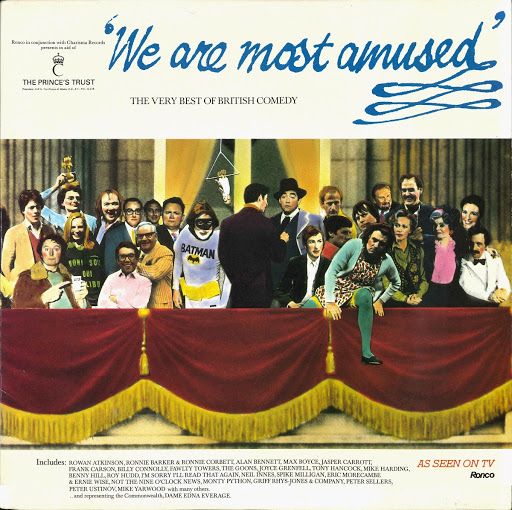
Both Prince Philip and Prince Charles have also shown plenty of enthusiasm over the years for many intentional laughter-makers. Philip (described boastfully by Bernard Manning as 'one of the boys') used to be an enthusiastic visitor to Variety Club and Water Rats events, while Charles even lent his name - or at least the name of his charity - to a compilation album of classic comic songs and sketches.
The younger generation, headed by Princes William and Harry, also seem eager enough to be seen meeting and greeting the best-known of the country's comic fraternity. The latter's ongoing tightrope walk with irony at least suggests a degree of openness to the form, while William's readiness to dabble in a bit of Blackadder opposite Stephen Fry for the BBC's televised Big Night In (2020) was certainly a welcome sign of good sportsmanship.
Public patronage, however, is not necessarily a reliable sign of private passions. The difficulty, for outsiders, is in determining who actually tickles the royal funny bone.
One might look at return engagements on the Royal Variety Performance as some kind of index of regal endorsement - in which case the scroll of honour would be headed by Max Bygraves (below) with no fewer than fourteen appearances, followed by Arthur Askey with ten, Ronnie Corbett with eight, Ken Dodd and Tommy Cooper with six, and Frankie Howerd, Jimmy Tarbuck, Tommy Trinder, Bob Monkhouse and Norman Wisdom with five. The problem with this method of measuring is that a coterie of show business grandees actually choose all of the acts, while the royals are merely required to sit back and survive them, so such statistics can be greatly misleading (The Queen meets with her Prime Minister every week, but she probably doesn't find him funny, either).
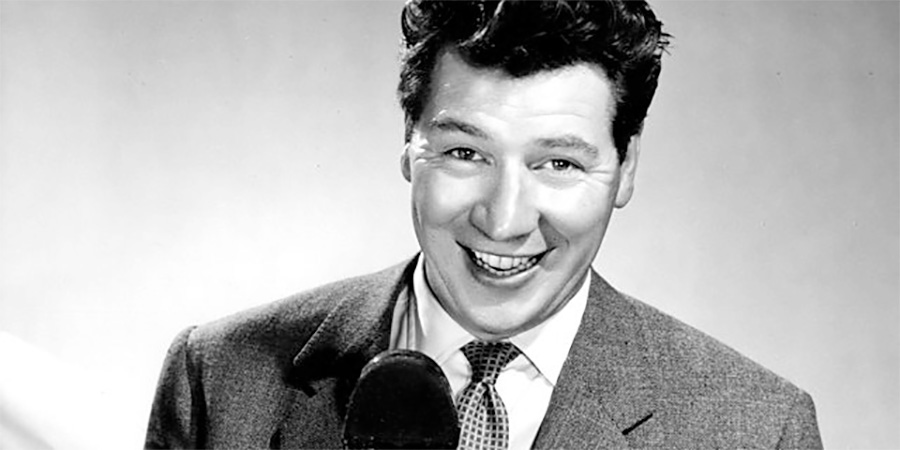
The same problem is encountered when one considers those comedians who are known to consort with the Crown in a non-comic context, because there are many reasons why royals may interact with professional comics without there being any sense that the former find the latter funny. The Prince's Trust is a telling example: Prince Charles makes a point of being seen to enjoy the company of those comedians (and there are many of them) who work as 'ambassadors' for his charitable institution, but that is no proof in itself that he actually finds any of them amusing rather than just relatively admirable, and commercially useful, individuals.
Omid Djalili, Michael McIntyre, Rob Brydon, Meera Syal, Sanjeev Bhaskar, Ben Elton, Patrick Kielty, Clive Anderson, Helen Lederer, Stephen Fry, Alexander Armstrong, Barry Humphries, Russell Kane and Jon Culshaw are all currently active as Prince's Trust ambassadors, but then so too are Idris Elba, Phillip Schofield, Gok Wan and Levi Roots, and it seems unlikely that the Prince of Wales regularly settles down in front of his newly-subscribed Sky TV ('Believe in better') to watch a phone-in on This Morning, while dressed in his belly-friendly basics, tucking into a plate of freshly-griddled crempogs spiced-up, just for the hell of it, with lashings of Reggae Reggae Sauce. Comedians can do many things for the royals without doing much, if anything at all, for their sense of humour.
More illuminating is the list of those performers who have been summoned specifically to perform at private or semi-private functions in one or another of the royal residences - but such a list does not exist officially, and can only be pieced together imperfectly by collecting stray references in newspaper reports, memoirs and off-the-record briefings.
Among those comedians whom we do know have been present at such events over the years (and in the past were usually booked by Peter Brough, the dapper ventriloquist who acted as the royals' unofficial entertainments liaison officer) are Morecambe & Wise, Frankie Howerd, Ken Dodd, Al Read, Arthur Askey, Tommy Cooper, Harry Worth, Ken Platt, Robb Wilton, Roy Castle, Jimmy Edwards, Bruce Forsyth, Peter Sellers, Harry Secombe, Charlie Drake, Ted Ray, Ronnie Corbett, Norman Wisdom, Les Dawson, Roy Hudd, Vic Oliver, Tony Hancock, Jimmy Tarbuck, Tommy Handley, Tommy Trinder and, yes, George Formby (but not Beryl).
Even this list is not entirely reliable, because, although at least a few of the Royal family were always present for these performances, the acts were sometimes hired primarily to entertain their staff, which somewhat blurs the line between duty and desire as far as the reason for royal attendance is concerned. In general, nonetheless, these are the choices that were made, for once, more by the Monarchy than the marketplace.
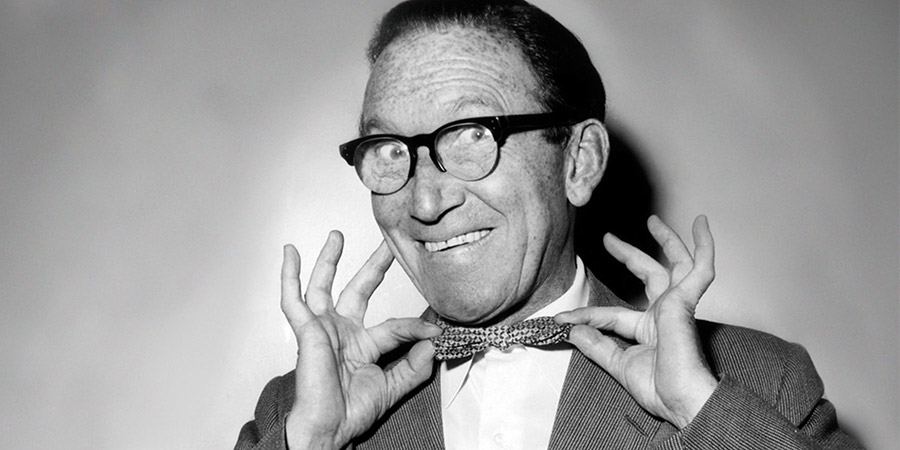
So what does such a selection tell us? It's basically three things: discretion, escapism and voyeurism.
Discretion is a sine qua non for such royal events. Although there is no strict code of omertà to uphold, any Beryl Formby-style bragging would have ensured that the comedian in question would not be called back. While the temptation, for some of them at least, to work the experience into an anecdote for their regular act must have been strong, they all proved themselves sufficiently obedient when it came to keeping shtum.
The key to winning a degree of regal trust, while in situ, is a willingness to self-police. As Frankie Howerd - who used to fortify himself with a large port and brandy before stepping out on to the royal stage - once explained, 'I am very careful not to be offensive when I appear before royalty. I usually tell stories against myself - none of my usual tasteless stuff. Well, I mean, it wouldn't do.'
It was this delicate sense of trust, whilst on 'home ground', that saw the royals relax sufficiently to allow their guests to indulge in some very gentle teasing, such as when Tommy Cooper asked The Queen if she was a fan of football, and, when she replied in the negative, he said, 'In that case, do you mind if I have your Cup Final tickets?' Eric Morecambe was afforded the same kind of licence: 'What are you doing at the moment?' The Queen once asked him. 'Standing here in front of you, Your Majesty,' he replied, wiggling his glasses and grinning.
As for the appeal of the comedy itself, escapism has always been one aspect that holds a peculiar royal appeal. For a family obsessed with rules and rituals, with the concept of duty drilled into the very depths of their collective psyche, it is no wonder that a dip into the joyous libertarianism of The Goons, for example, should have proven so intoxicatingly cathartic - especially for the Gordonstoun-strained soul of the young Prince Charles.
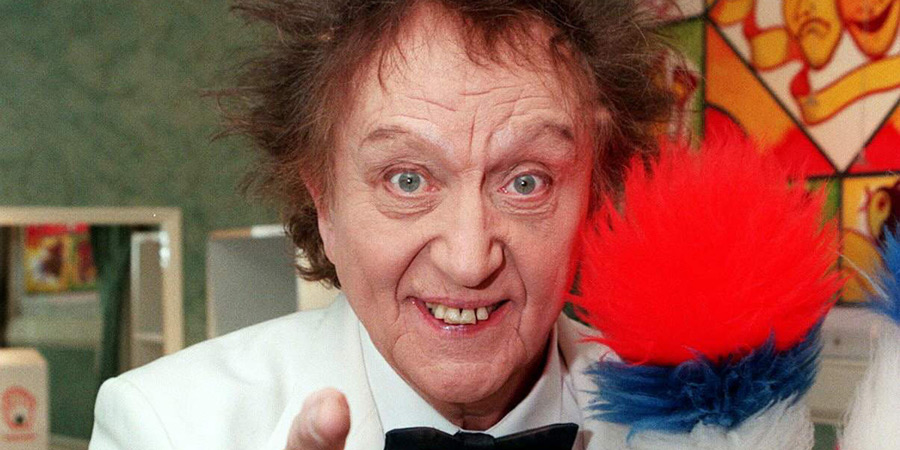
The same could be said, to a lesser extent, about the playful, whimsical, harmless style of humour of Ken Dodd (above) and Tommy Cooper. With no threat of such controversial matters as current affairs - of either the political or marital kind - being mentioned and mocked, the royals could sit back and relish the sheer silliness of it all. Dodd's private performances, in particular, proved so remorselessly amusing that, according to one who was there, 'he had Princess Margaret's mascara running down her face'.
The other attraction for the royals is voyeurism. Comedy is simply one way - and actually an unusually effective way - of providing an insight into how people really live, and think, and talk and interact. This is especially invaluable for a family that, during the course of its usual ventures into the outside world, is encouraged to believe that everywhere in the United Kingdom constantly smells of fresh paint, is newly-carpeted, and every citizen always wears their best outfits, speaks in a strange 'fancy' accent and walks about ramrod straight with a nervous smile stuck on their face.
This is one of the reasons why the royals have in the past been so transfixed by sitcoms such as Steptoe And Son and, especially, Till Death Us Do Part. It was in shows like these that they could actually see working class characters behaving in believable ways, and arguing about contemporary subjects concerning class, sex, race, money and politics (as well as, on occasion, summing up what some of the subjects were really currently thinking about their sovereign). One half hour of Alf Garnett revealed more to the royals about their society than countless encounters with genuflecting lord mayors, respectfully reticent generals and gong-greedy CEOs.
What serves as recognition humour for us can sometimes act as ethnographic research for them. When, therefore, the likes of Al Read (below) or Ken 'I won't take me coat off - I'm not stoppin'!' Platt stood up in the palace and performed their dialogue-driven routines about ordinary provincial life, it was fascinating as well as fun for royals, whose infrequent visits to those parts of the country were usually limited to lightning-fast ribbon-cutting occasions. Hearing Al Read set the scene in an ordinary hospital waiting room, or at the butcher's or in the corner shop, or out in the garden where the arm-folded gossips hovered either side of the fence, was probably almost as exotic an experience for the royals as it would have been for a bunch of labourers in Leigh listening to an account of what larks the Keeper of the Privy Purse gets up to.
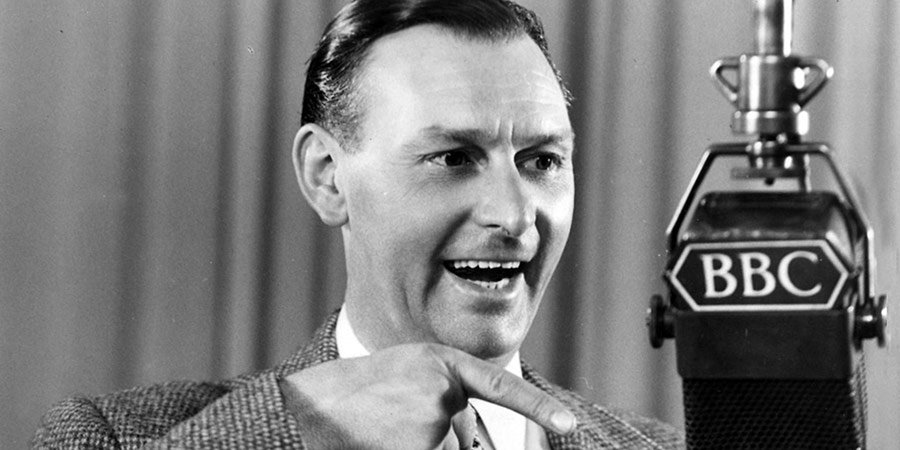
Does such comic insight still penetrate the Crown today? It depends which insider is looking out at it, and from where they happen to be. In LA, where dentistry rates higher than ethics and even horoscopes are taken seriously, real humour seems in perilously short supply (sniggering at Oprah is in practical terms probably far more dangerous these days than mocking a monarch), but back in London, and across the rest of the United Kingdom, there is surely still enough authentic, honest and humbling laughter to send a lesson or two to a few.
This is what humour, at its best, can do - it amuses, it enlightens and it connects. The Royals have always had the huge privilege of being able to have an audience with some of the country's finest comics, and it is rather reassuring to know that, even now, it is a privilege that does not go entirely wasted.
So, for all their coyness about the subject, the Royal family does indeed enjoy, in moderation, good British comedy, and, in a manner that's usually overlooked or underappreciated, they actually benefit from it, too. Bagehot was right when he said that there will always be a distance kept between us and them, but at least comedy can help stop that gap from becoming a chasm.
In these testing times for both parties, it really helps if both of you get the joke.
Help us publish more great content by becoming a BCG Supporter. You'll be backing our mission to champion, celebrate and promote British comedy in all its forms: past, present and future.
We understand times are tough, but if you believe in the power of laughter we'd be honoured to have you join us. Advertising doesn't cover our costs, so every single donation matters and is put to good use. Thank you.
Love comedy? Find out more
